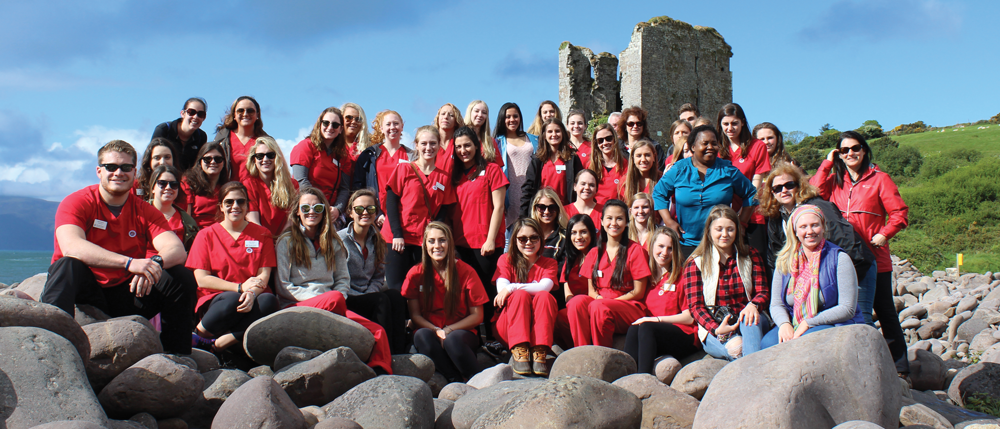More Than The Luck of The Irish
SHU in Dingle may be student nursing's gold at the end of the rainbow.
From the spring 2023 issue of the Sacred Heart University Magazine
Tucked away in the country fishing village of Dingle, Ireland, resides a little miracle. An academic miracle, to be sure, but a miracle, nonetheless. It’s nearly unheard of for student nurses to study abroad, even for a time. To spend an entire semester abroad, even more rare. To spend an entire semester abroad and get ahead? It’s a miracle in the making.
 “To go abroad for an entire semester is very rare in nursing because we have to meet the requirements of our accreditors; we don’t even let our students take classes at other universities in the U.S.,” says Heather Ferrillo, Ph.D., MSN, APRN, FNP-BC, CN, undergraduate nursing chair at Sacred Heart. And yet that’s exactly what’s happening in a one-of-a-kind program that allows SHU’s Davis & Henley College of Nursing students the opportunity of a full semester abroad at the University’s campus in Dingle.
“To go abroad for an entire semester is very rare in nursing because we have to meet the requirements of our accreditors; we don’t even let our students take classes at other universities in the U.S.,” says Heather Ferrillo, Ph.D., MSN, APRN, FNP-BC, CN, undergraduate nursing chair at Sacred Heart. And yet that’s exactly what’s happening in a one-of-a-kind program that allows SHU’s Davis & Henley College of Nursing students the opportunity of a full semester abroad at the University’s campus in Dingle.
To achieve this, the Dingle program has been structured as a “mirror image” of the one back home. “The two nursing courses offered, Health Assessment and Pathophysiology, were taught using the same information in the same style as that used for the rest of the students who were completing the courses in the U.S.,” says Ryan Powers ’24, who is a global ambassador, classroom learning assistant (CLA) and vice president of the Men Entering Nursing Club at SHU. “This meant that as far as our academic schedule went, we were still on track to graduate as normal, even being gone from campus for a whole semester.”
What’s more, the nursing students in Ireland do their clinical placements while abroad, which means not only do they keep pace academically with their counterparts back home, but as far as requirements for graduation are concerned, they actually return to campus ahead.
The program started as a two-week Nursing Leadership course, but quickly grew to also include the current full-semester program accommodating 40‒42 students in upcoming terms. And it’s competitive. With a 100% recommendation rate from graduates, it’s an attractive option for nursing students for more than the obvious reason of travel while studying abroad. Doing those clinical placements in Ireland means the student nurses have the unheard-of opportunity to not only study nursing, but to study an entirely different philosophy of nursing.
As Ireland has a primarily socialized medical system, and preventive medicine is vastly more cost-effective than treating an established illness, Irish nurses are known for delivering unparalleled preventive care. If a primary care patient is on the path to developing diabetes, rather than run dozens of diagnostic tests or begin prescribing medication, an Irish nurse is more likely to prescribe an exercise and nutritional program and then follow it up with a trip out to their patient’s farm to ensure they’re taking care and eating right (yes, house calls are still a thing in Ireland). The goal is to stop disease in its tracks, either before it starts or in its early stages, through the power of preventive care.
Even in private hospitals in Ireland, like Bon Secours Hospital in nearby Tralee where Sydney Barone ’24 did her clinicals, that difference in care is evident. “I observed the differences between a nurse’s routine, the use of equipment, medication administration and preferred nursing interventions compared to those I have experienced,” Barone says.
Their first concern? Actively listening to what the patient has to say. How a patient’s lifestyle habits, home life and stressors might be influencing them physically are all examined, along with the labs and scans. It’s not just symptom management; it’s looking for the root cause—a practice that fits the “holistic view that Sacred Heart talks about of mind, body and spirit,” Barone says.
The result is care that contributes to fewer preventable deaths and a longer life expectancy in Ireland, at a fraction of the cost of healthcare in the U.S. And it’s care that SHU nursing students now get to not only read about, but practice firsthand.
“It’s an instinct,” Barone says of the way her clinical experience in Ireland informed her practice of delivering patient-centered care—a bedside practice that, as she says, can be “shared among peers, professors and professionals to advance best practices in health care overall.”
